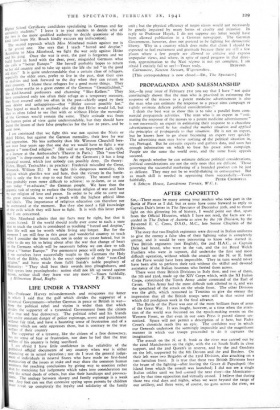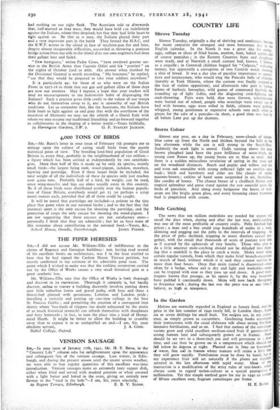AFTER CAPORETTO
Sta,--There must be many among your readers who took part in the Battle of Piave as I did, but as none have come forward to reply to Captain Dale's letter in The Spectator of December zoth, and to throw light on this glittering bit of history, I would point out that, apart from the Official Histories, which I have not read, the facts are re- corded in The Defeat of Austria as seen by the 7th Division, by the Reverend E. C. Cross, D.S.O., M.C., late Senior Chaplain of the Division.
The story that two English regiments were dressed in Italian uniforms to give the enemy a false idea of their fighting value is completely untrue, and it would be very interesting to know who started it. Two British regiments (not English), the 2nd H.A.C., as Captain Dale had heard, who were in the van, and the ass Royal Welch Fusiliers who were in support, did undertake the first and most difficult operation, without which the assault on the N. or E. bank of the Piave would have been impossible. They in turn would never have been able to perform their task without the skilful and devoted assistance of the Italian boatmen who ferried them across.
There were three British Divisions in Italy then, and two of them, the 7th and 23rd, made up the XIV Corps which, with the XI Italian Corps, constituted the Tenth Army under command of the Earl of Cavan. This Army had the most difficult task allotted to it, and was the spearhead of the attack on the whole front. The other Division was the 48th, which remained in Trentino to give the enemy the impression that all the British troops were still in that sector and which did prodigious work in the final advance.
The Battle of the Piave was one of the most brilliant feats of arms of the Great War. It was fought, however, at a time when the atten- tion of the world was focussed on the epoch-making events on the Western Front, so that even in our own Press it passed almost un- noticed. Space will not permit a description of it here, but Padre Cross's chronicle reads like an epic. The confident way in which our Generals undertook the seemingly impossible and the magnificent manner in which "our troops proceeded to do it captures the imagination.
The assault on the N. or E. bank of the river was carried out by the 22nd Manchesters on the right, with the 1st South Staffs in close support, and the 2nd Queen's in reserve, and by the and Gordons on the left, supported by the 8th Devons and the znd Borders. On their left were two Brigades of the 23rd Division, also attacking on a two battalion front. It is true that these two British Divisions bore the brunt of the fighting—after leaving the Grave di Papadopoli (the island from which the assault was launched) I did not see a single Italian soldier until we had Limed the next rivei—the Monticano- and by that time opposition nad virtually ceased. I believe that during those two vital days and nights, when we were beyond the range of our artillery, and there were, of course, no guns across the river, we had nothing on our right flank. The Austrians told us afterwards that, half-starved as they were, they would have held cut indefinitely against the Italians, whonithey despised, but that they had little heart to fight against us. Be that as it may, the Italians played their part and a very important part in the battle They ferried the H.A.C. and the R.W.F. across to the island in face of machine-gun fire and later, despite almost insuperable difficulties, succeeded in throwing a pontoon bridge across from our side to the island after our own engineers had done their gallant best and failed.
" Few foreigners," writes Padre Cross, " have rendered greater ser- vice to the British Army than Captain Odini and his " pontieri " on the nights of October 23rd to 26th. His answer when thanked by the Divisional General is worth recording. '` My boatmen," he replied, " say that they would be prepared to take your soldiers anywhere."
It is particularly sac; for those of us who were on the Italian Front in 1917-18 to think that our gay and gallant allies of those days are now our enemies. May I express a hope that your readers will lend no encouragement to the fashionable habit of disparaging the Italians? Such a practice gives little credit to the valour of our troops who do not themselves stoop to it, and is unworthy of our British traditions. Let us remember that, like the Austrians, the Italians have little heart to fight against us and pray that with the overthrow of the murderer of Matteotti we may see the rebirth of a liberal Italy with whom we may resume our traditional friendship and go forward together as collaborators in the shaping of a better world.—Yours faithfully,



























 Previous page
Previous page